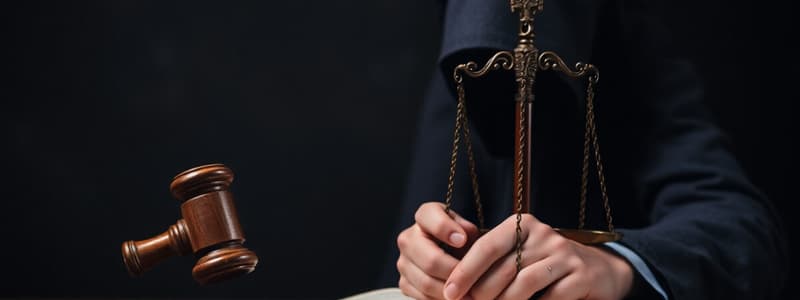Podcast
Questions and Answers
Which of the following is NOT listed as a job opportunity for criminologists?
Which of the following is NOT listed as a job opportunity for criminologists?
- Police officer (correct)
- Researcher
- Correctional administrator
- Law enforcement administrator
What is the requirement for a person to be considered a qualified criminologist under Republic Act No. 6505?
What is the requirement for a person to be considered a qualified criminologist under Republic Act No. 6505?
- Must have a degree in Law
- Must pass the criminologist examination (correct)
- Must work in a correctional institution
- Must have a degree in Sociology
Which study field is included in the sciences related to criminology?
Which study field is included in the sciences related to criminology?
- Astrophysics
- Philosophy
- Economics (correct)
- Geology
What type of institutions fall under the agencies and sectors associated with criminology?
What type of institutions fall under the agencies and sectors associated with criminology?
Which of the following is NOT considered a public agency related to criminology?
Which of the following is NOT considered a public agency related to criminology?
What primary aspect does criminology study?
What primary aspect does criminology study?
What is a key feature of sociology of law?
What is a key feature of sociology of law?
Which area is primarily concerned with crime prevention and delinquency?
Which area is primarily concerned with crime prevention and delinquency?
What defines criminology as a social science?
What defines criminology as a social science?
Which aspect of criminology indicates its need for contributions from various disciplines?
Which aspect of criminology indicates its need for contributions from various disciplines?
What is one reason for the significance of studying criminology?
What is one reason for the significance of studying criminology?
How does criminology exemplify a dynamic field of study?
How does criminology exemplify a dynamic field of study?
Which discipline is NOT typically associated with criminology?
Which discipline is NOT typically associated with criminology?
What is the Latin origin of the term 'criminology'?
What is the Latin origin of the term 'criminology'?
Who coined the term 'criminology' in 1885?
Who coined the term 'criminology' in 1885?
What does the 'sociology of law' primarily study within criminology?
What does the 'sociology of law' primarily study within criminology?
Which branch of criminology focuses on the reasons behind why crimes are committed?
Which branch of criminology focuses on the reasons behind why crimes are committed?
What refers to the study of how society reacts to law-breaking?
What refers to the study of how society reacts to law-breaking?
RA 11131 refers to what aspect of criminology?
RA 11131 refers to what aspect of criminology?
What is excluded from the scope of criminology?
What is excluded from the scope of criminology?
Criminology as a body of knowledge includes which of the following areas?
Criminology as a body of knowledge includes which of the following areas?
What was a successful project implemented by the Peace related to criminology courses?
What was a successful project implemented by the Peace related to criminology courses?
Which of the following criticisms applies to the Demonological School's theory?
Which of the following criticisms applies to the Demonological School's theory?
According to the Classical School of thought, what is the basis for punishment?
According to the Classical School of thought, what is the basis for punishment?
What was a key belief held by the Demonological School regarding the cause of crime?
What was a key belief held by the Demonological School regarding the cause of crime?
What does the term 'utilitarian philosophers' imply in the context of the Classical School?
What does the term 'utilitarian philosophers' imply in the context of the Classical School?
Which of the following options does NOT represent a characteristic of the Demonological School's penal code?
Which of the following options does NOT represent a characteristic of the Demonological School's penal code?
What is a primary tenet of the Classical School regarding human behavior?
What is a primary tenet of the Classical School regarding human behavior?
What did the Civil Service Commission recognize regarding the NAPOLCOM police examination?
What did the Civil Service Commission recognize regarding the NAPOLCOM police examination?
What is Ferri's definition of criminal psychology?
What is Ferri's definition of criminal psychology?
What fundamental principle did Garofalo reject?
What fundamental principle did Garofalo reject?
What does Human Ecology Theory emphasize about crime?
What does Human Ecology Theory emphasize about crime?
Which body type is associated with crimes of violence according to Kretschmer's classification?
Which body type is associated with crimes of violence according to Kretschmer's classification?
Which body type tends to commit deception and fraud according to Kretschmer?
Which body type tends to commit deception and fraud according to Kretschmer?
What did William Herbert Sheldon propose about heredity?
What did William Herbert Sheldon propose about heredity?
What is the focus of Kretschmer's classification system?
What is the focus of Kretschmer's classification system?
What theory did Robert E. Park advocate regarding crime?
What theory did Robert E. Park advocate regarding crime?
Flashcards are hidden until you start studying
Study Notes
Criminology Definition
- Criminology is the scientific study of crime's nature, extent, causes, and control.
- Criminology focuses on both individual and societal aspects of criminal behavior.
Origin of Criminology
- The term "Criminology" was coined in 1885 by Italian law professor Raffaele Garofalo.
- French anthropologist Paul Topinard used the French term "Criminologie".
Scope and Divisions of Criminology
- Criminology encompasses laws, law-breaking, and societal reactions to law-breaking.
- It delves into how laws are made, why laws are broken, and how societies respond to law-breaking.
Sociology of Law
- Examines the nature and structure of laws within a society.
- Aims to scientifically analyze laws to understand crime causation and prevent future crime.
Criminal Etiology
- Focuses on understanding the reasons behind crime causation.
- Explores why crime occurs despite the existence of laws.
Penology
- Studies societal reactions to crime, including responses from individuals, criminals, and the government.
- Contributes to the development of modern measures for treating criminal offenders.
Branches of Criminology
Criminal Etiology/Criminal Behavior
- Investigates the origins and causes of crime.
- Studies reasons for crime commission.
Sociology of Law
- Analyzes the development of criminal laws as a form of social control.
Penology/Correction
- Focuses on crime and delinquency prevention as a form of social reaction to criminality.
Criminalistics/Forensic Science
- Assists in crime detection and investigation by studying physical evidence left at crime scenes.
Nature of Criminology
- A Social Science: Criminology is a social science because it examines crime as a social phenomenon.
- An Applied Science: Criminology utilizes principles and methods from other sciences to analyze and address crime.
- Nationalistic: Criminology focuses on the existing criminal law within a specific territory.
- Dynamic: Criminology evolves alongside social changes, adapting to advancements in other fields.
- Interdisciplinary: Criminology draws insights from disciplines like sociology, psychology, psychiatry, and economics to understand crime.
Importance of Studying Criminology
- It provides a philosophical foundation for life.
- It serves as a foundation for professional careers and social service.
- It helps understand criminals and control criminal behavior.
- It addresses the significant costs associated with crime, including property loss, medical expenses, and emotional distress.
Filipino Criminologist
- Defined as a graduate of a Criminology degree, passed the Criminologist examination, and registered with the Board of Criminology.
- Career paths include: professor, law enforcement administrator, consultant, criminalistics technician, correctional administrator, counselor, and researcher.
Related Studies and Sciences
- Law
- Sociology
- Psychology
- Medicine
- Chemistry
- Public Administration
- Education
- Theology
- Economics
Associated Agencies and Sectors
- Legislative bodies and lawmakers
- Law enforcement agencies
- Courts and Prosecution
- Correctional institutions
- Educational institutions/schools
- Public charitable and social agencies
- Public welfare agencies
- Non-government organizations
- The family and the home
- The church
- Private charitable and welfare institutions
- Civic clubs and organizations
- Print media, radio, and television
Historical Accounts and Evolution of Criminology
Demonological School
- This school viewed crime as demonic possession, attributing criminal behavior to evil forces.
- The penal code focused on driving out the demon through methods like whipping, burning, and other forms of physical torture.
Criticism of Demonological School
- Unscientific and irrational
- Barbaric and cruel penal code
Three Major Criminology Schools of Thought
Classical School
- Focused on individual free will and rational decision-making.
- Argued that proportionate punishment could deter crime.
- Key figures include: Jeremy Bentham and Cesare Beccaria
Positivist School
- Emphasized factors beyond individual control, such as biology, psychology, and social environment.
- Advocated for scientific methods to understand crime and treat criminals.
- Key figures included Cesare Lombroso, Enrico Ferri, and Raffaele Garofalo
Chicago School
- Focused on the role of social environment and urban social structures in influencing criminal behavior.
- Led to the development of community-based interventions and policy changes.
- Key figures included Robert E. Park, Clifford Shaw, and Henry McKay
Biological Theories
- Attributed criminal behavior to biological factors such as genetics, brain abnormalities, and hormonal imbalances.
- Key Figures:
- Cesare Lombroso: Developed the theory of the "born criminal" based on physical characteristics.
- Enrico Ferri: Emphasized the interaction of biological, social, and environmental factors in crime causation.
Sociological Theories
- Examined the social and cultural factors that contribute to crime.
- Key figures included:
- Émile Durkheim: Emphasized the importance of social order and anomie in crime causation.
- Robert Merton: Proposed strain theory, which suggests that crime arises from a gap between societal goals and legitimate means to achieve them.
- Edwin Sutherland: Developed differential association theory, which suggests that crime is learned through social interaction.
- Albert Cohen: Argued that status frustration among lower-class youth contributes to delinquency.
Psychological Theories
- Focused on individual personality, cognitive processes, and mental states as factors in crime.
- Key Figures:
- Sigmund Freud: Developed psychoanalysis and proposed that unconscious drives and conflicts can lead to criminal behavior.
- B.F. Skinner: Proposed operant conditioning theory, suggesting that behavior is shaped by rewards and punishments.
Social Control Theories
- Explained crime as a result of weakened social bonds and lack of social control.
- Key Figures:
- Travis Hirschi: Developed social bond theory, which emphasizes the importance of attachment, commitment, involvement, and belief in preventing crime.
- Walter Reckless: Proposed containment theory, suggesting that internal and external controls can prevent delinquency.
Other Factors Contributing to Crime
- Poverty and economic inequality
- Discrimination and social injustice
- Family dysfunction and breakdown
- Substance abuse and addiction
- Exposure to violence and trauma
- Media influences and cultural factors
Studying That Suits You
Use AI to generate personalized quizzes and flashcards to suit your learning preferences.




